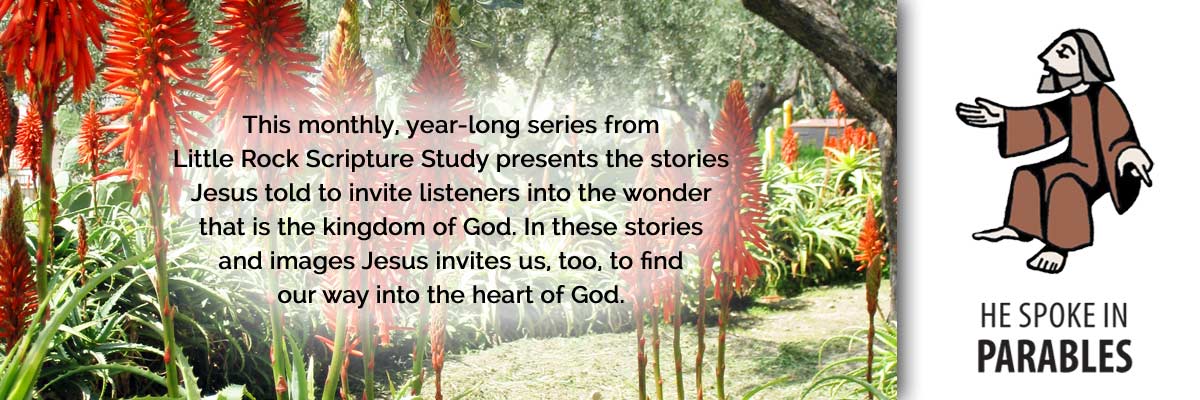Official Website of the
Catholic Diocese of Little Rock
Every tree is known by its fruits
Published: February 19, 2015
This is the second column in a 12-part series.
By Cackie Upchurch
Director of Little Rock Scripture Study
Jesus used both lengthy and brief parables to teach because that was not unusual in his culture. Rabbis told such stories because they were effective; parables engaged listeners and moved them to ponder or question or take action. In her commentary on the parables of Jesus, Amy Jill Levine reminds us that we might be better off “thinking less about what parables mean and more about what they can do: remind, provoke, refine, confront, disturb …”

In a simple and brief section of the Sermon on the Plain in Luke’s Gospel and the Sermon on the Mount in Matthew’s Gospel, we find an excellent example. Jesus has been talking about hypocrites and false teachers and then says simply, “A good tree does not bear rotten fruit, nor does a rotten tree bear good fruit. For every tree is known by its own fruit” (Luke 6: 43-44; see also Matthew 7:17-18).
I have a distinct recollection of being in second grade and hearing my teacher talk about how you can tell a tree by its fruit. I assumed she was teaching us something about natural biology, something about the differences between pear trees and apple trees and peach trees. It seemed an obvious observation even to a 7 year old. That simple truth from the natural world, however, reveals something profound about our nature as moral beings.
In its original Gospel context, this teaching was geared to serve as a sharp warning against hypocrites. It helped Jesus’ hearers evaluate those who claimed leadership roles as prophets and teachers. He was reminding his followers of a tool that had been tested over the centuries. The criterion for recognizing a true or false prophet had always been to look at their deeds. Isaiah and Jeremiah had both noted that the just ones produce good deeds while the deeds of the wicked will bring judgment upon them (see Isaiah 3:10; Jeremiah 17:10). Psalm 1 speaks of the just one who is “like a tree planted near streams of water, that yields its fruit in season.”
The brief parable of the tree and its fruit in the Gospel accounts serves as a warning about leaders, including religious leaders. What is the message they preach? And how do their actions reflect what they say they believe? Is there continuity? This parable, though, also serves as a kind of self-examination. Just as the fruit of a tree reveals its nature, and the health of that fruit gives evidence of the tree’s vitality, so the fruit of our lives offers evidence of who we are.
We might begin by considering what our words and actions say about us and about the God who lives within us. Is the fruit of our lives expressed in care for others or in self-centeredness? Are we producing words and deeds that communicate generosity or do they send a message that promotes greed? Are we working for justice for those on the margins or do our words and deeds further alienate those already left out? Do we communicate gentleness and peace or do our lives speak of chaos? What fruit do we produce?
Jesus goes on to say in Luke 6:45, “A good person out of the store of goodness in his heart produces good, but an evil person out of the store of evil produces evil; for from the fullness of the heart the mouth speaks.” In the ancient Mediterranean world where the Bible came to be, the heart was not simply the seat of one’s emotions. More importantly, it was the center of a person’s moral, intellectual and spiritual life. There is the suggestion here that we can become aware of our heart’s choices by paying attention to what we talk about and where we invest our energy and skills.
The words of Jesus remind us that truly moral living requires interior transformation, the kind of transformation that he offers as his words continue to speak to us today. A tree can enjoy all kinds of external conditions that are ideal — moderate rains, ample sunlight, and good temperature ranges — but without being fed by rich nutrients in the soil, the fruit will not appear.
If this simple teaching using a tree and its fruit has evoked some kind of deeper thought within us, or a desire to examine our routine ways of acting and thinking, then the parable continues to do its job.
Study Questions
- Do you agree that the power of a parable is found in what it evokes within us, not simply in what it means? Give an example.
- Read Psalm 1 that contains the image of a tree planted by streams of water. What other images can you think of to communicate how nature might teach us about how to live?
- In what ways does the parable of the tree being known by its fruit help you to consider what it means to be a moral person?
- How would you describe the fruit produced by the tree of your life at this time?
This article was originally published in Arkansas Catholic Feb. 14, 2015. Copyright Diocese of Little Rock. All rights reserved. This article may be copied or redistributed with acknowledgement and permission of the publisher.




